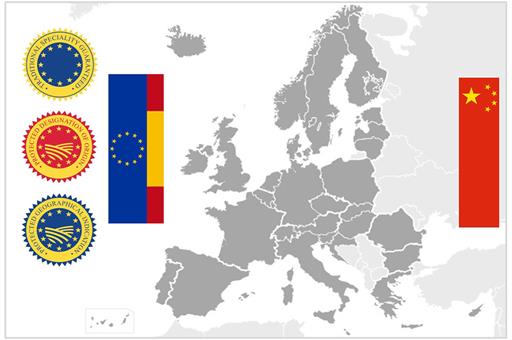Luis Planas welcomes agreement between EU and China to protect Spanish geographical indications for gourmet foods
News - 2019.11.7
In the fourth year of application, this protection will extend to 175 denominations and geographical indications, of which 36 are Spanish.
"This is a major step forward in protecting of declarations of quality in such an important market as China", said the Spanish minister.
This bilateral agreement brings protection against imitations and usurpation of 100 indications in China for foods and drinks with designations of origin or protected geographical indications (PGI). These 100 indications include eight wines (the designations of origin of Rioja, Cava, Catalunya, La Mancha, Valdepeñas, Jerez, Navarra and Valencia), two olive oils (the protected designations of origin of Sierra Mágina (Jaén) and Priego de Córdoba (Córdoba), 1 spirit (the protected geographical indication of Brandy de Jerez) and one cheese (the designations of origin of Queso Manchego).
The Spanish minister viewed in a positive light the formalisation of this agreement that is expected to enter effect in late 2020 after passing through the corresponding process at the European Parliament and the Council of EU Ministers.
Luis Planas highlighted the huge potential of the Chinese market for the agri-food sector at a time when opening up new markets is essential. Economic development, urban development and growth, by the Chinese middle class above all, have led to a change in food demand in China.
Furthermore, the Spanish minister underlined the added value of foods with geographical indications, especially for the rural environment, given that the figures of outstanding quality - which can be found throughout Spain - stand as a key element in development and sustainability policies affecting rural communities.
Greater protection in four years
Once the agreement takes effect, a list of 12 Spanish indications will be protected in China. This will be increased to 36 in the fourth year.
The list of 36 Spanish indications that will be protected in China in the fourth year after the agreement takes effect includes:
- Aciete del Bajo Aragón, (oil), Jamón and Paleta de Teruel (non-Iberian ham), and wines from Somontano and Cariñena.
- Citrus fruit from Valencia, Jijona turrón and Turrón de Alicante, and the Alicante and Utiel-Requena wines.
- Oils from Antequera, Baena, Estepa, Sierra de Cazorla, Sierra de Segura; wines from Málaga and Manzanilla de Sanlúcar; Iberian hams from Los Pedroches and Jabugo (supra-regional), and Vinagre de Jerez.
- Saffron from La Mancha and the Montes de Toledo and Campo de Montiel oils, as well as wine from Jumilla (its production zone is also in Murcia).
- Wines from El Bierzo, Ribera del Duero, Rueda, Toro and Guijuelo (Iberian hams, supra-regional).
- Dehesa de Extremadura ham.
- Wines from El Empordá, Penedés and Priorat, as well as Siurana (oil).
- Jumilla (wine, supra-regional denomination, given that its production zone is also in Albacete).
- Queso de Mahón-Menorca (cheese).
- Wine from Rías Baixas (wine).
- Pacharán Navarro (spirit).
Non official translation





